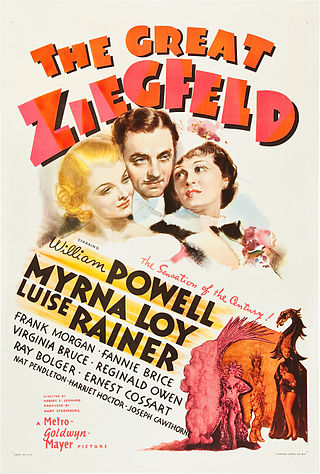
The Great Ziegfeld is a 1936 American musical drama film directed by Robert Z. Leonard and produced by Hunt Stromberg. It stars William Powell as the theatrical impresario Florenz "Flo" Ziegfeld Jr., Luise Rainer as Anna Held, and Myrna Loy as Billie Burke.
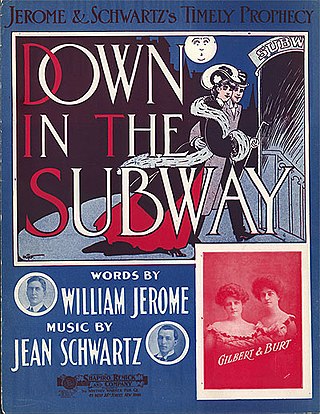
William Jerome Flannery, September 30, 1865 – June 25, 1932) was an American songwriter, born in Cornwall-on-Hudson, New York of Irish immigrant parents, Mary Donnellan and Patrick Flannery. He collaborated with numerous well-known composers and performers of the era but is best remembered for his decade-long association with Jean Schwartz with whom he created many popular songs and musical shows in the 1900s and early 1910s.
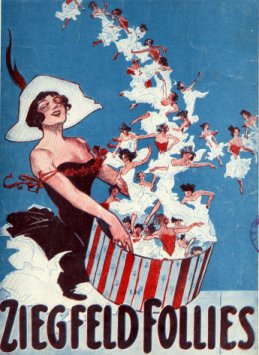
The Ziegfeld Follies were a series of elaborate theatrical revue productions on Broadway in New York City from 1907 to 1931, with renewals in 1934 and 1936. They became a radio program in 1932 and 1936 as The Ziegfeld Follies of the Air.

Van and Schenck were popular American entertainers in the 1910s and 1920s: Gus Van, baritone, and Joe Schenck (pronounced "skenk"; born Joseph Thuma Schenck,, tenor. They were vaudeville stars and made appearances in the Ziegfeld Follies of 1918, 1919, 1920 and 1921. They made numerous phonograph records for the Emerson, Victor, and Columbia record companies.

Yip Yip Yaphank is a 1918 musical revue by Irving Berlin. He wrote and produced the show during World War I, after he was drafted into the United States Army and was serving in 152nd Depot Brigade at Camp Upton in Yaphank, New York. The military revue was performed by the soldiers of Camp Upton. It moved to Broadway after a brief tryout at the camp.
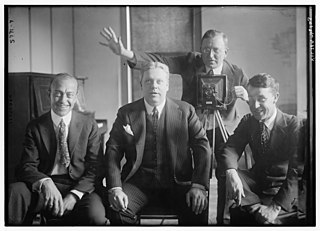
The Peerless Quartet was an American vocal group that recorded in the early years of the twentieth century. They formed to record for Columbia Records, where they were credited as the Columbia Quartet or Columbia Male Quartet. From about 1907, when they began to record for record labels other than Columbia, they were more widely known as the Peerless Quartet.
Raymond Blanning Egan was a Canadian-American songwriter of popular music. Many of his songs have appeared in films and musical theatre. He often collaborated with composer Richard A. Whiting.
Louis Achille Hirsch, also known as Louis A. Hirsch and Lou Hirsch, was an American composer of songs and musicals in the early 20th century.
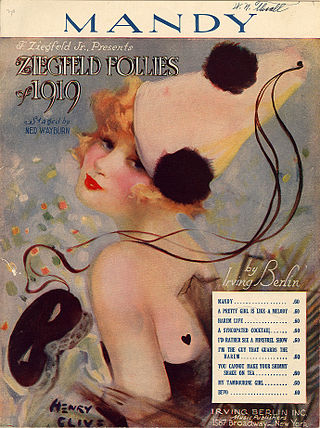
"Mandy" is a popular song by Irving Berlin, published in 1919.
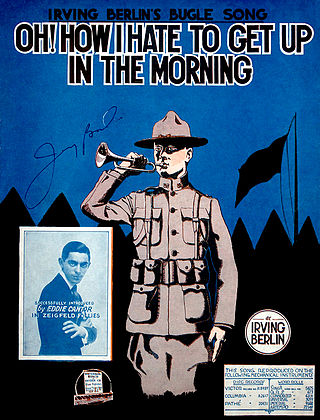
"Oh! How I Hate to Get Up in the Morning" is a song written by Irving Berlin in 1918 that gives a comic perspective on military life. Berlin composed the song as an expression of protest against the indignities of Army routine shortly after being drafted into the United States Army in 1918. The song soon made the rounds of camp and became popular with other soldiers, partly because hatred of reveille was universal.
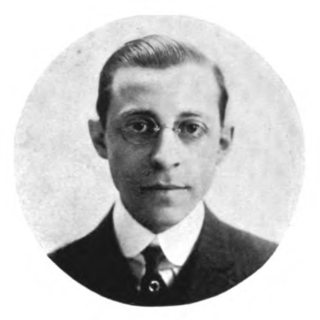
David Stamper was an American songwriter of the Tin Pan Alley and vaudeville eras, a contributor to twenty-one editions of the Ziegfeld Follies, writer for the Fox Film Corporation, and composer of more than one thousand songs, in spite of never learning to read or write traditional music notation. He may have written "Shine On Harvest Moon", a claim supported by vaudeville performer and writer Eddie Cantor. He was also a charter member of the American Society of Composers, Authors and Publishers or ASCAP.

Robert North was an American vaudeville performer who became a success as a stand-up comedian. Later he became a prolific motion picture producer.

"Would You Rather Be a Colonel with an Eagle on Your Shoulder or a Private with a Chicken on Your Knee?" was a World War I war song by songwriter and performer Arthur Fields. Fields' version was recorded for Columbia Records in 1918.

"Au Revoir, but not Good Bye: Soldier Boy" is a 1917 song composed by Albert von Tilzer, with lyrics written by Lew Brown.

"We Don't Want the Bacon (What We Want Is a Piece of the Rhine)" is a World War I–era song released in 1918. The lyrics were written by "Kid" Howard Carr and Harry Russell, and the music composed by Jimmie Havens. The song was published by Shapiro, Bernstein & Co. of New York City. On the cover is a soldier tearing through a large piece of bacon with his bayonet. A fearful-looking Kaiser Wilhelm II is standing on the bacon. It was written for voice and piano.

"Tom, Dick and Harry and Jack " is a World War I era song released in 1917. Howard Johnson wrote the lyrics. Milton Ager composed the music. The song was published by Leo Feist, Inc. of New York City. Artist Henry Hutt designed the sheet music cover. It features four men in different service uniforms with an inset photo of either Jack Connors, Jr. or Bailey and Cowan. The inset photo varies by edition. It was written for both voice and piano.

Germaine Mitti, also known as Germaine Mitty, was a French dancer who appeared with the Ziegfeld Follies and in vaudeville revues of the 1920s.
The Ziegfeld Follies of 1919 was a revue produced by Florenz Ziegfeld Jr. Billed as the thirteenth edition of the Ziegfeld Follies series, it had a tryout at Nixon's Apollo Theatre in Atlantic City, New Jersey, on June 10, 1919 and opened at Broadway's New Amsterdam Theatre on June 16, 1919 and closed on December 6, 1919. It is often considered to be the best and most successful of the Follies series produced by Ziegfeld.
The Follies of 1907 is a 1907 musical revue which was conceived and produced by Florenz Ziegfeld Jr. The first of several theatrical revues that are collectively known as the "Ziegfeld Follies", the work contained songs material written by a variety of individuals; including music by Seymour Furth, E. Ray Goetz, Gus Edwards, Billy Gaston, Jean Schwartz, Silvio Hein, Matt Woodward and Gertrude Hoffman; and lyrics by Vincent Bryan, Edgar Selden, Will D. Cobb, Billy Gaston, William Jerome, Matt Woodward, Martin Brown and Paul West. Harry B. Smith authored the words for the comedic and dramatic sketches used in-between the musical numbers; as well as serving as head lyricist. Herbert Gresham staged the production and Max Hoffman, Sr. served as the musical director.
Seymour Furth was an American songwriter, composer, and librettist active from the late 1890s until his death in 1932. He wrote popular songs for Broadway musicals, vaudeville, tin pan alley, and minstrel shows; notably creating the opening musical number for the first Ziegfeld Follies in 1907. He most frequently worked as a composer with another collaborator serving as his lyricist, but sometimes he created both music and lyrics, and at other times just words with other composers. He composed piano works in popular styles of his day, including ragtime. His best known songs were comedic, including "Nothing Like That in Our Family" (1906) and "No Wedding Bells For Me" (1907).















